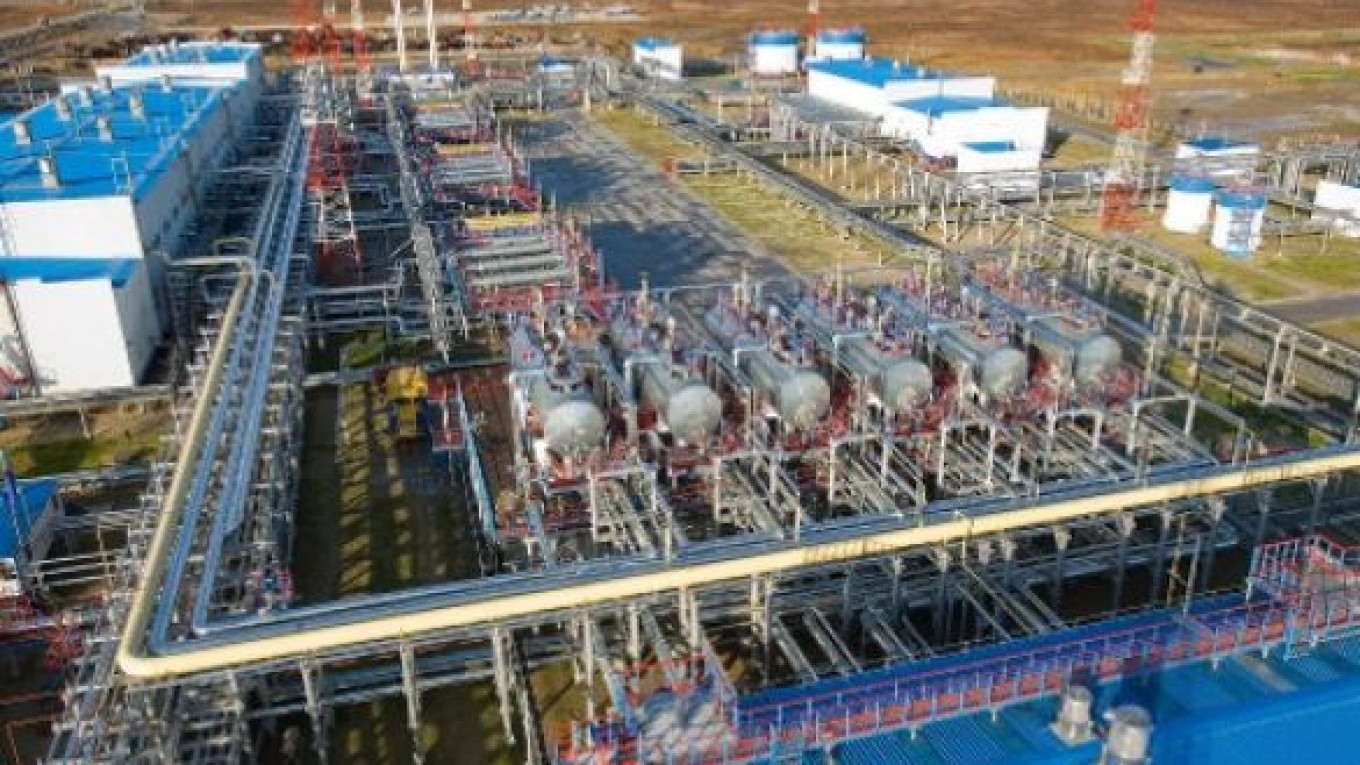Prime Minister Dmitry Medvedev said Tuesday that the situation regarding payments by Ukraine for Russian gas was “critical,” during a meeting at his suburban residence concerning payment for gas deliveries.
Ukraine owes Gazprom $882 million for August gas supplies, said Alexei Miller, the head of Russia’s gas giant, earlier Tuesday.
“Ukraine has already reacted. They said there were problems with payment for gas, but they were not critical. But I think that … they are critical,” Medvedev said, Interfax reported.
“We are very worried about Ukraine’s payments for gas,” Miller said, Itar-Tass reported
Ukraine's state oil and gas firm, Naftogaz, declined to comment on Gazprom's remarks, but Prime Minister Mykola Azarov said the government was "monitoring the issue," Reuters reported.
"This primarily is a question concerning two companies, and they have to sort things out," Azarov's press service said
The two countries have been exchanging rhetoric and comments as Ukraine approaches a November date to sign a free trade agreement with the EU at a summit in Vilnius.
On Sunday, President Vladimir Putin and his counterpart Victor Yanukovych spent five hours at a closed-door meeting in Sochi, discussing “matters raised at the EurAsian summit in Minsk,” according to a transcript on Putin’s official website.
“The fact that no results of this meeting were reported means that Ukraine was not offered a suitable proposal,” Andrei Tomsky, a political analyst and chief editor of Ukrainian news agency Zavtra was quoted by Business FM radio as saying.
But political analysts both in Ukraine and Russia denied that the conflict might lead to new gas wars between the two countries.
“The possibility of an such outcome is unlikely, and it seems that the conflict could be resolved by dialog,” said Alexander Pasechnik, head of think tank National Energy Security Fund's research department said.
Russia has always strived to negotiate with Ukraine on the terms of gas supplies and prices, he added. “A week ago, Ukraine was given a large discount on a gas shipment to be stored in its underground tanks and is also being granted loans to purchase gas,” Pasechnik said.
“Russia is taking every possible measure to ensure against the disruption of its gas transit to Europe,” he added.
Miller said an additional agreement had been signed for the contract to supply gas for the sum of $882 million, with payment postponed until Oct. 1. But although it is the end of the month, the company has not received the money yet, he added.
“The situation is very serious, bearing in mind that according to the contract details, if the country does not keep to the payment schedule, a pre-payment will be demanded before gas is supplied,” Miller was quoted as saying.
The idea to demand upfront payment for gas has already been backed by Medvedev.
But analysts warned against demanding an upfront payment from Ukraine as the financial situation in the country is far from stable.
“Let’s remember that Ukraine already owes Gazprom about $7 billion for undersupplied gas in 2012 under the take-or-pay agreement,” said Grigory Birg, an analytic with Investcafe.
At the same time, Ukraine’s economy is staggering, and its gold reserves are at a seven-year minimum, he said.
“If Ukraine is unable to pay for Russian gas, this may lead to a suspension of gas supplies, as happened before,” Birg said.
Russia could give a loan to Ukraine to make that upfront payment, although it does sounds strange, Pasechnik said. However, there comes a time when loans have to be paid out and that would lead to more complications, he added.
President Vladimir Putin’s spokesman Dmitry Peskov said Tuesday that Ukraine’s gas debts were not connected with the country’s intention to sign a trade agreement with the EU, although they did surface at a time when these plans are being widely discussed.
Meanwhile, Russia’s Foreign Minister Sergei Lavrov said Monday that residents from Ukraine should cross Russia’s border using international passports rather than internal documents, which is now common practice.
But he and his Ukrainian counterpart said that introducing visa regimes between the countries would be a “catastrophic mistake.”
Lavrov also said that if Ukraine signed a trade agreement with the EU there would be no break in relations, but Russia will not offer any preferences either.
Russia and Ukraine began to reinforce “weak spots” on their border with barbed wire, news reports said Monday. This is a normal measure to prevent criminals and smuggled goods from crossing the border, a Ukrainian border guard officer told Rosbalt Ukraine. Both Russians and Ukrainians are carrying out the work, he said, denying that it implied any imminent change in the visa regime.
Contact the author at [email protected]
A Message from The Moscow Times:
Dear readers,
We are facing unprecedented challenges. Russia's Prosecutor General's Office has designated The Moscow Times as an "undesirable" organization, criminalizing our work and putting our staff at risk of prosecution. This follows our earlier unjust labeling as a "foreign agent."
These actions are direct attempts to silence independent journalism in Russia. The authorities claim our work "discredits the decisions of the Russian leadership." We see things differently: we strive to provide accurate, unbiased reporting on Russia.
We, the journalists of The Moscow Times, refuse to be silenced. But to continue our work, we need your help.
Your support, no matter how small, makes a world of difference. If you can, please support us monthly starting from just $2. It's quick to set up, and every contribution makes a significant impact.
By supporting The Moscow Times, you're defending open, independent journalism in the face of repression. Thank you for standing with us.
Remind me later.






